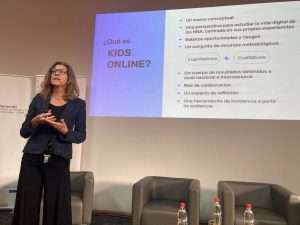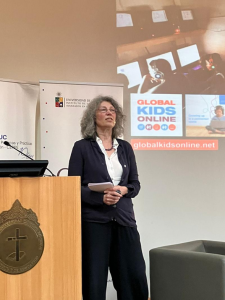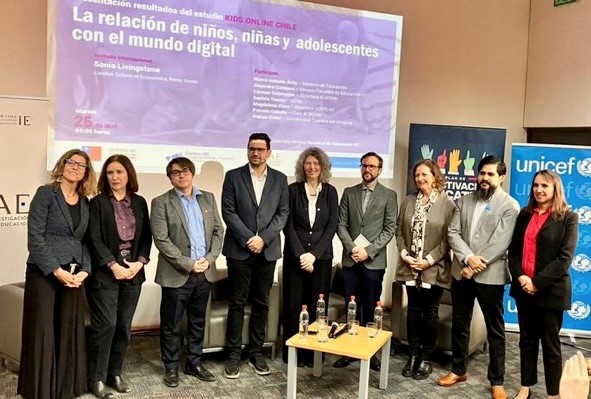 The latest Global Kids Online survey was conducted in Chile in 2022 in collaboration with the Chilean Ministry of Education (MINEDUC) and UNICEF. This study offers valuable insights into the digital experiences of children and adolescents, highlighting digital inequality, device usage patterns, online practices, risky experiences, and parental and school mediation. Conducted in 131 schools nationwide, it surveyed over 3,000 children and adolescents.
The latest Global Kids Online survey was conducted in Chile in 2022 in collaboration with the Chilean Ministry of Education (MINEDUC) and UNICEF. This study offers valuable insights into the digital experiences of children and adolescents, highlighting digital inequality, device usage patterns, online practices, risky experiences, and parental and school mediation. Conducted in 131 schools nationwide, it surveyed over 3,000 children and adolescents.
A previous nationally representative study on children’s internet use in Chile was carried out in 2016 in partnership with Ipsos Chile. It examined children’s online practices, opportunities, digital skills, the risks they encounter, and the support provided by parents and educators.
Read the latest findings report (in Spanish)
Key Findings
- Early digital adoption: In Chile, 58% of children and adolescents acquire their first internet-enabled mobile phone before the age of 10. Internet access for educational purposes is on the rise, both for schoolwork and informal learning.
- Changes over time: The study found that the average age at which children receive their first mobile phone has dropped from 11 years in 2016 to 8.9 years in 2022. Eighty-seven per cent of surveyed children and adolescents reported owning an internet-enabled mobile phone. The most significant increases in access were observed among children aged 0-5 years (from 2% in 2016 to 9% in 2022) and 6-9 years (from 30% to 49%).
- Socio-economic disparities: While socio-economic disparities persist, the gap between high- and low-income households is narrowing. Overall, 92% of children have access to an internet-enabled mobile phone, compared to 88% in lower-income and 83% in middle-income households.
“The pandemic accelerated digital access in households as children required internet connectivity for remote learning, even at the kindergarten level. At the start of the pandemic, nearly half of households with young children relied on mobile phones for internet access. Mobile phones have become essential tools for participation in various activities and should not be viewed solely as a concern but as part of an evolving social process,” explains lead researcher Patricio Cabello.
 Digital practices in schools
Digital practices in schools
The study also explored digital practices in schools, revealing that internet-based assignments are commonplace. Among respondents:
- 87% are asked to search for information for schoolwork,
- 83% submit assignments online,
- 77% watch educational videos,
- 76% collaborate on shared documents and review tasks on online platforms.
However, only about one-third reported frequent guidance from teachers in these activities. “These findings highlight the need to strengthen teachers’ ability to support students in effectively using the internet for learning,” note study authors Magdalena Claro and Patricio Cabello.
 Children’s online activities
Children’s online activities
Regarding internet use, training (71%) and informal learning (46%) were the most common activities, followed by socialising (37%), studying (28%), creative activities (23%), and participation in online discussions (14%). The most frequently used platforms include: WhatsApp (77%), TikTok (68%), Music streaming services (73%), YouTube (70%), Google (60%), Instagram (52%).
Girls and female adolescents tend to engage more with social platforms like Instagram and TikTok, while boys and male adolescents are more inclined towards gaming and video-based platforms like Discord and YouTube.
Informal learning and study practices
The study also found that:
- 68% of children and adolescents seek information on topics of interest online.
- 61% watch instructional videos or tutorials.
- One-third use the internet to find explanations for subjects they struggle with in class.
“These informal learning practices reflect both new modes of education and supplementary study strategies, which should be considered when designing effective pedagogical approaches for younger generations,” says Magdalena Claro.
The results suggest that internet use is becoming more uniform across socio-economic groups, with minimal disparities between children from different backgrounds.
According to Claro and Cabello, “These findings show that digital engagement among children and adolescents in Chile has grown significantly. The role of parents and teachers is crucial in guiding and supporting positive internet use, helping children develop digital skills that enable them to seize opportunities while mitigating risks from an early age.”
Further information
- Kinds Online Chile 2023 (full report in Spanish, executive summary in Spanish)
- Read about the launch (in Spanish), including comments from the Ministry of Education and UNICEF on how they will build on the findings, extending Global Kids Online’s track record on research impact.
- Sonia Livingstone’s keynote presentation on “What have we learned“
- “Childhood and adolescence in the digital age“: a comparative report of the Kids Online surveys in Brazil, Chile, Costa Rica and Uruguay
- Infância e adolescência na era digital: Um relatório comparativo dos estudos Kids Online Brasil, Chile, Costa Rica e Uruguai (in Portuguese)
- Infancia y adolescencia en la era digital: un informe comparativo de los estudios de Kids Online del Brasil, Chile, Costa Rica y el Uruguay (in Spanish)
News (in Spanish)
- Se adelanta a los 8,9 años el acceso al celular con Internet y crece su uso para tareas escolares y aprender cosas que les gustan
- Revive el Webinar de los principales resultados y hallazgos del estudio Kids Online 2022
- Estudio revela alta dependencia de los adolescentes chilenos con Internet y las redes sociales
Project team
Dr Patricio Cabello is an Assistant Professor at the Center for Advanced Research in Education (Centro de Investigación Avanzada en Educación, CIAE) at the Institute of Education, University of Chile. He is also the Head of Kids Online Chile.
Dr Magdalena Claro is Associate Professor and Director of the Centre for the Study of Policies and Practices in Education (Centro de Estudios de Políticas y Prácticas en Educación, CEPPE), at the Faculty of Education of the Pontificia Universidad Católica de Chile (UC). She is a Lead Investigator of Kids Online Chile.
Amaranta Alfaro, academic and researcher at the Journalism Department in Universidad Alberto Hurtado (Chile).








